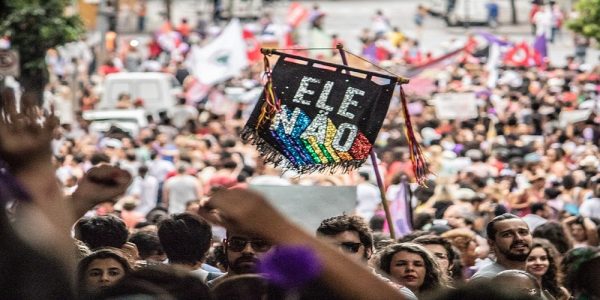Ganó Bolsonaro. El próximo presidente de Brasil es racista, misógino, homófobo y protofascista, y no podemos subestimar el peligro que esto significa para la democracia, para los trabajadores, los negros, los pueblos originarios, las mujeres y la disidencia sexual brasileña. El ex capitán reivindica abiertamente la dictadura militar que gobernó Brasil de 1964 a 1985; en la recta final de la campaña prometió “barrer a los rojos del país”, amenazó con encarcelar o exiliar a opositores, censurar a la prensa que lo critica.
Detrás de Bolsonaro se encolumnan la gran burguesía, la oligarquía terrateniente, las Iglesias evangélicas y elementos abiertamente fascistas ligados a las Fuerzas Armadas. Su programa implica una brutal ofensiva contra los trabajadores, para maximizar las ganancias capitalistas incrementando la explotación al máximo. También implica una ofensiva de la agenda conservadora contra los derechos de las mujeres y la disidencia sexual, los negros y los pueblos originarios.
Sin embargo, el voto mayoritario a Bolsonaro representa el hartazgo de gran parte de las clases medias y los sectores más empobrecidos, pero no un apoyo a su programa. Por el contrario, los millones que salieron a las calles al grito de “ele não” en los días previos al ballotage, demuestran que sí sobran fuerzas en el pueblo brasileño para frenarlo. Qué tanto logre o no avanzar Bolsonaro se dirimirá en las calles. Es hora de organizar la resistencia.
A su vez, no es posible comprender el triunfo de Bolsonaro, ni organizar una resistencia efectiva, sin tomar en cuenta que fueron la traición y el fracaso del PT y de los gobiernos “progresistas” de la región, que le abrieron la puerta a la derecha. América Latina tuvo una oportunidad histórica la década pasada, a partir del ascenso revolucionario que liquidó a varios regímenes que habían implementado la sumisión al neoliberalismo imperialista, y llevó al poder a nuevos gobiernos que generaron expectativas en un rumbo soberano, independiente, y -en el caso del bolivarianismo- socialista. Pero todos aceptaron el marco del capitalismo como límite y se transformaron en gerentes del mismo. En todos se desarrolló una extendida corrupción. Ante la crisis económica mundial, ninguno tomó medidas a favor de los pueblos, todos optaron por salvar las ganancias capitalistas e imponer regímenes autoritarios y represivos para aferrarse en el poder. La crisis humanitaria venezolana y la dictadura asesina de Ortega en Nicaragua son la peor cara del fracaso del “progresismo” latinoamericano. Pero Brasil no fue excepción.
Lula, el presidente obrero, llegó a la presidencia en 2003 con más de 70% de aprobación. Pero las gigantescas expectativas que los trabajadores depositaron en el PT, se convirtieron en amarga desilusión. Lula gobernó para las corporaciones y los terratenientes. Dilma además comenzó a aplicar un brutal ajuste al pueblo cuando entró la crisis económica. La resultante pérdida de base social le permitió a la derecha orquestar el golpe institucional y posteriormente encarcelar y proscribir a Lula. Tampoco ante esos hechos estuvo el PT dispuesto a confiar en la movilización o llamar al paro y la lucha para enfrentar a la derecha.
Como tampoco la campaña de Haddad ofreció nada nuevo que entusiasme a los brasileños para que lo votasen. Tras el fulminante resultado de la primera vuelta, en la que Bolsonaro le sacó casi 20 puntos de diferencia a Haddad, el candidato del PT se dedicó a buscar el apoyo de los demás candidatos del establishment y de intentar convencer a la burguesía de que él sería mejor garantía que Bolsonaro para sus negocios.
Muy a pesar de Haddad y el PT, que se esfuerzan por mostrarse como todo aquello que los brasileños vienen rechazando -y que Bolsonaro viene capitalizando- las masivas movilizaciones de los últimos días de campaña, un verdadero movimiento en defensa de la democracia, lograron achicar la brecha de votos por la mitad, y demostraron la fuerza con la que el pueblo enfrentará el gobierno de Bolsonaro.
Hoy la tarea urgente es organizar la resistencia para enfrentar el programa reaccionario del nuevo gobierno. Al fascismo sólo se lo puede derrotar en las calles, organizando en los barrios, las universidades, las fábricas y todos lados. Al mismo tiempo, tenemos el desafío impostergable de fortalecer al PSOL como alternativa real a Bolsonaro, el PT y demás partidos capitalistas, lo cual sólo es posible si recuperamos un rumbo anticapitalista que ofrezca a los millones de brasileños que no quieren saber más nada con el establishment, una salida por izquierda y socialista. Por todo esto, necesitamos una organización revolucionaria que se ponga a la cabeza de las luchas y dispute por una orientación consecuente en el PSOL. Nuestros compañeros de Alternativa Socialista-PSOL y Anticapitalistas en Red nos comprometemos enteramente a esta tarea.




